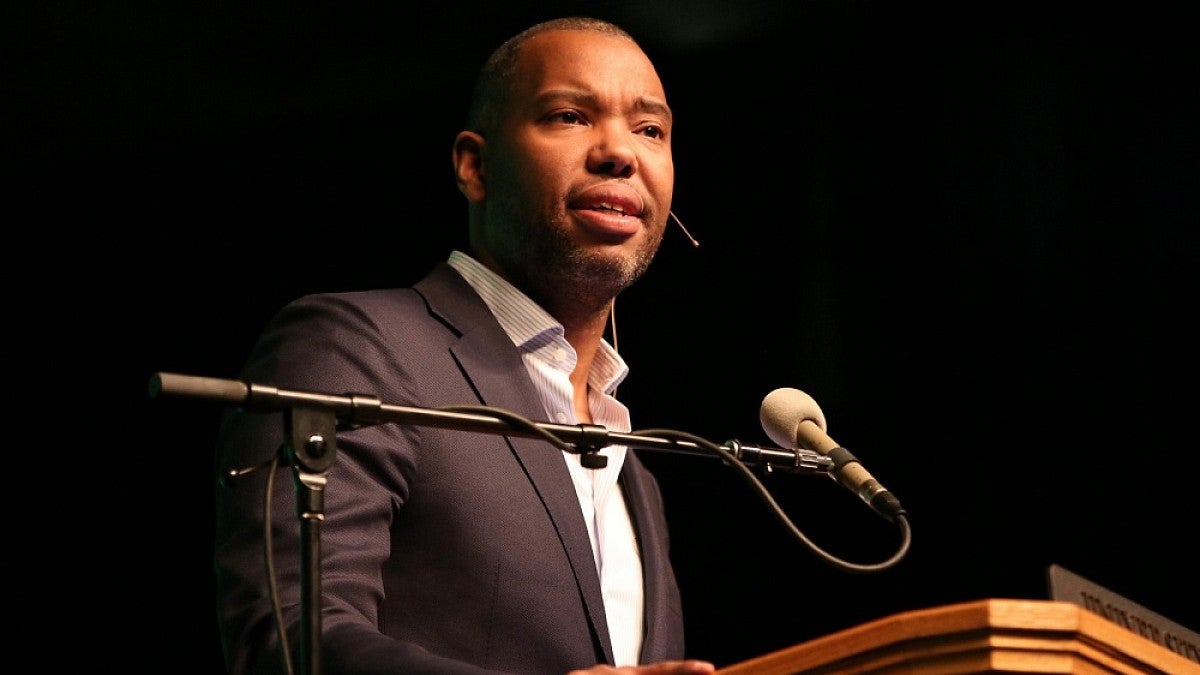Ta-Nehisi Coates is known for his willingness to shine an uncompromising light on uncomfortable subjects.
When the National Book Award-winning author of the 2016-17 UO Common Reading selection “Between the World and Me” took the stage Friday evening to a standing ovation, he quickly aimed his spotlight toward the elephant hiding in the packed Matthew Knight Arena.
“If you look at the most decorated universities across the country, athletics tend to be a really big cash generator,” Coates said. “Just look where I’m giving this talk right now. … University systems across the country should spend some time thinking about the extent to which the wealth they have accumulated was drawn from black bodies.”
At another school these words might be met with shocked silence. But the 2017 UO School of Journalism and Communication’s Ruhl Lecture, titled “A Deeper Black: Race in America,” fell in the midst of a year of difficult reckonings — on campus, across the nation and around the world.
“Today, perhaps more than at any period in my lifetime, each of us is having to come to terms with issues of race and equality,” UO President Michael Schill said in the evening’s opening remarks. “For many Black Americans — particularly those growing up in segregated urban communities — the road is full of potholes, many of which are created by current acts of discrimination, and many more by our legacy of racial discrimination.”
Coates’ talk was part of the president’s new African American Workshop and Lecture Series, one of several initiatives launched this year to enhance diversity and inclusion on campus. But not all the dialogue has been easy.
Controversy ignited across campus and in the national media when a law school professor wore blackface on Halloween. And earlier this month, Schill announced the university would not dename Deady Hall, which memorializes a Civil War-era judge who supported Oregon’s 1849 exclusion law but later backed the 14th and 15th amendments to the U.S. Constitution.
“‘Between the World and Me,’ like much of our guest’s work, provokes us, makes us think hard and invites us to enter a debate about the role of race in our society,” Schill said in his remarks Friday. “Out of this discussion, I hope, will come greater understanding and a commitment among all of us to encourage our nation to live up to its ideals.”
Earlier Friday, Coates spent the afternoon meeting with students in the School of Journalism and Communication. The school’s Robert and Mabel Ruhl Endowment sponsored the Ruhl Lecture with help from the Hearst Foundation for Visiting Professionals Endowment and the president’s office.
Coates found much to discuss with students in a question-and-answer session moderated by journalism instructor Lisa Heyamoto and Carolyn S. Chambers Distinguished Professor of Advertising Deborah Morrison.
“One of the things I found relevant to Eugene and the UO were his thoughts on ‘white guilt,’” said senior Meerah Powell, who wrote the recent Eugene Weekly cover story “Black by Unpopular Demand.” “‘Between the World and Me,’ though emotionally evocative and important, is not a platform to guilt all modern-day white people into thinking they're responsible for slavery. It's a realistic look at life as a black man in America. If you’re applying it to your own ‘guilty’ experience, you might be missing the point.”
To read more about Coates’ visit with students, see “Ta-Nehisi Coates connects with SOJC students during campus visit” on the School of Journalism and Communication website.
Much of Coates’ work — including an award-winning blog; his first book, “The Beautiful Struggle”; and The Atlantic cover stories “Fear of a Black President,” “The Case for Reparations” and “My President Was Black” — dives precipitously into the depths of America’s history of enslaving and discriminating against its own black citizens.
“When people talk about slavery, they speak like it was a mistake somebody made while everything else was going great, … a bump on the road,” Coates said during his lecture. “Slavery isn’t a bump. Slavery is the road. There is no America without the enslavement of African-Americans.”
At the crux of Coates’ message is the premise that “race is the child of racism, not the father.” Race is not a biological reality, he says, but rather a social construct engineered to justify oppression in the pursuit of wealth and power.
“In the antebellum South, owning people was how you built wealth,” he explained. “You aspired to get a piece of land taken from Native Americans and put a (black) body on it.”
Coates argues that this extraction of wealth from black bodies did not end with the Emancipation Proclamation, but lives on today. His lecture drew clear lines connecting this dark history to the racially charged events dominating today’s headlines, from mass incarceration and police brutality to President Trump’s recent executive order banning refugees and travelers from seven predominantly Muslim countries.
“As an African-American who has studied the history of race-making in this country and is now watching policies being passed … to put people in position so things can be extracted from them, I just want to say to the Arab-American community … that I am with you,” he said. “It would be contrary to my history to not be with you. … It is horrifying, heartbreaking to see it happening again.”
Although he acknowledged that the United States still has far to go, Coates saw reason for hope in the nearly 5,700 students, faculty and community members who gave up their Friday night to hear a lecture about the difficult issues the nation faces.
“Your vote matters!” he concluded. “We have some tough times ahead of us. But you guys should be inspired. The very fact that there are so many of you here … is so inspiring to me.”
—By Andra Brichacek, School of Journalism and Communication


